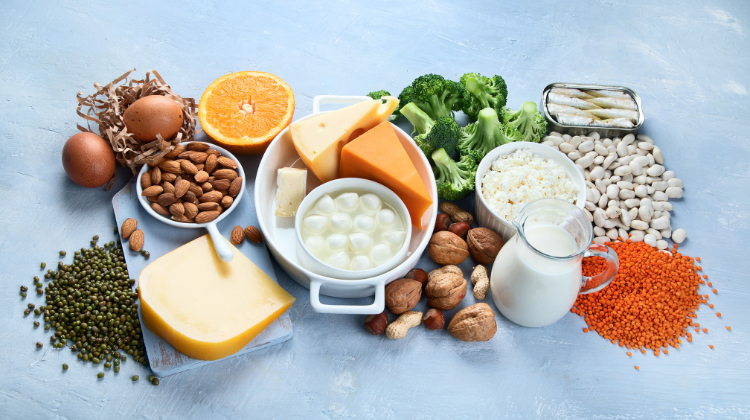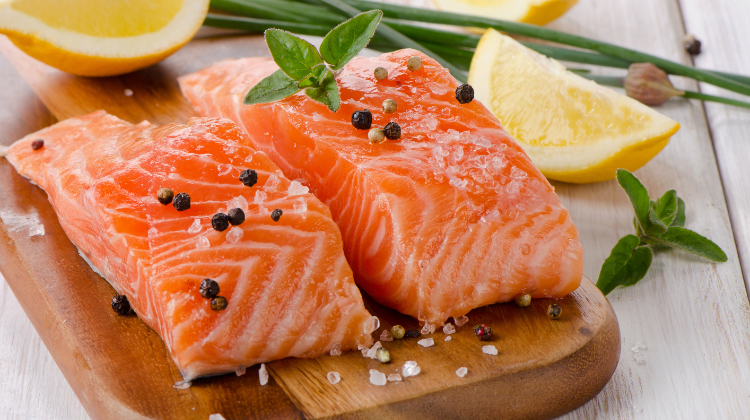How Long Does It Take To Gain Weight? Things You Should Know 2024

Even though everyone is focusing on losing weight, there is a fine line between being fit and healthy and being underweight due to poor nutrition. Also, It may seem backward, but instead of wanting to lose weight, there are several reasons a person might want to put on a few extra pounds, such as:
- Recovering from surgery
- Malnourishment from medical reasons
- Muscle gain for physique reasons
- Genetically high metabolism
For people who struggle with weight gain, the question “how long does it take to gain weight” can be frustrating. This article discusses types of weight gain, how long it takes to gain weight, and how to get started gaining weight the healthy way.
How Long Does It Take To Put On Weight?
The secret to healthy weight gain is choosing nutrient-dense foods and skipping empty calories like processed foods. When you consume empty-calorie foods like cookies, soda, candy, and fast food, you are not feeding your body what it requires to produce muscle, support strong bones, or rebuild tissue. Instead, you need nutrient-dense foods with vitamins, minerals, essential fatty acids, and fiber.
There are a lot of products advertising “miraculous” weight gain as well as weight loss. But, if it sounds too good to be true, it probably is or is not safe. So, how long does it take to gain a pound? A healthy weight gain is 1-2 pounds per week. Anything more is too taxing on your body or probably is just water weight.
What Impacts Weight Gain?
There are only two options when it comes to gaining weight. You can gain weight by adding muscle mass and thus by lean muscle gain or by simply consuming excess calories and thus increasing your body fat mass.
Suppose you are questioning how long it takes to gain muscle weight. In that case, you will need to slowly increase your calorie and protein intake while exercising with weight and utilizing some supplemental protein powders. This approach may also include tracking your macronutrients, meaning the process will take longer.
Alternatively, it is much less if you wonder how long it takes to gain weight after eating. According to a study[1] done by Oxford University, when you ingest fat, it takes only an hour to get into the bloodstream after eating, then two more hours to get into our fatty tissue. So that’s all it takes, 3 hours!
So, in summary, if you want to gain weight and are not concerned about whether it is fat mass or muscle, you can increase your calorie surplus very rapidly and thus gain weight much faster. However, this most likely means the weight gained will be excess fat gains.
How fast you gain weight is dependent on a few different things, such as:
- Level of physical activity
- Eating habits, including portion sizes
- Genetics
- Medical conditions
- Medicines – some can influence appetite and metabolism
- Eating disorders (past or present can affect metabolism)
- Drug or Alcohol use
- Lifestyle Habits
- Sleep adequacy
- Environment
How Many Calories Do You Need To Gain Weight?
The first thing you must establish before forming your plan is your basal calorie needs. Your basal calorie needs or resting metabolic rate is the number of calories your body needs when it is doing nothing (or at rest).
There are several online sites where you can fill in a few figures to estimate your calories, but if you wish to put in the calculation yourself, the Mifflin-St Jeor equation[2] is the most reliable and has the narrowest error range.
- Men: (4.536 × weight in pounds) + (15.88 × height in inches) − (5 × age) + 5 = Resting Energy Needs
- Women: (4.536 × weight in pounds) + (15.88 × height in inches) − (5 × age) − 161 = Resting Energy Needs
After calculating your resting energy needs, you need to multiply that number by an activity factor to get your total calorie needs. You can find these activity factors below.
- x1.2 if you do not exercise
- x1.375 if you exercise lightly 1-3 days per week
- x1.55 if you exercise 3-5 days per week
- x1.725 if you exercise 6-7 days per week
- x1.9 if you exercise daily or have a physically demanding job
Now, you should have a great starting number of calories you’ll need daily to maintain weight. So, let’s discuss how many calories to add daily to gain weight.
When starting your journey, aim for 500 to 1000 extra calories daily. Five hundred additional calories per day will result in a pound a week of weight gain, and 1000 additional calories daily will result in 2 pounds gained weekly.
If you are looking to gain lean muscle mass, make the majority of those calories from lean protein sources such as:
- Eggs
- Seafood
- Legumes
- Beans
- Chicken
- Flaxseed
Weigh yourself every week at the same time of day. Ideally, right after you wake up in the morning after you have used the restroom. Your goal should be a weight gain of 1-2 pounds weekly.
So, if you ask yourself how long it takes to gain weight, the answer depends on how much you want to lose! For example, if you are waiting to gain 15 pounds, it will, on average, probably take around 8 – 15 weeks.
A lot of people ask whether you can gain weight in one day. And the answer is yes, it’s feasible to gain poundage in just a day.
However, this is not related to lasting weight gain but is due to retained water, how full your stomach is, how much pee is in your bladder, or other influences but not lasting weight gain. However, a lasting weight gain occurs when we change our eating and exercise habits. Below are some tips.
How to Gain Weight in The Healthy Way
Eat frequently

When you are trying to put on weight, you may feel full quickly. Several small meals (5-6) will help you take in more calories throughout the day.
Choose nutrient-rich and energy-dense foods

Some great examples are:
- Avocados
- Nut butters
- Smoothies with whole milk, flaxseeds, chia seeds, and whole milk yogurt
- Protein shakes
- Olive oil and avocado oils
- Whole fat dairy such as yogurt, milk, cottage cheese
- Dried fruit
Drink smart

Drinking water or other fluids right before meals or with a meal can lower your appetite.
Try to drink at least an hour before or after a meal. Also, choose calorie-dense drinks. Liquid calories such as protein shakes, milkshakes, or smoothies are an excellent way to promote weight gain.
Add calories

Add energy-dense foods to meals you are already eating so you are eating more without the bulk — add cheese and butter to crackers, nut butter to smoothies, and even dried milk to beverages.
It would be best if you avoided excess saturated fat, and emphasis should be on omega-3s to reduce the risk of heart disease and build endurance[3].
Strength train

Weight training is the best way to build up your muscles. Exercise may also stimulate your appetite.
Precautions When Gaining Weight
There are always a few things to be aware of when trying to gain weight. So be aware and try to implement the following suggestions.
Slow and steady always wins

Many creations on the market promote fast weight gain, but 99.9% of the time, these are too good to be true. The only way you can healthily and realistically encourage weight gain and keep it on is by slow and steady progress.
I know you are excited to see your results, but it will take some time. So have patience. You’ll get the results you desire.
Don’t forget your fruits and veggies

Many people, when gaining weight, want to stop eating fruit and vegetables first since they are low in calories. But these foods are vital to a healthy diet. In addition, they are chocked full of vitamins, minerals, and fiber, all of which your body needs to put on weight safely.
Avoid too much protein

Consuming too much protein is typical for athletes and people who focus on gaining muscle for personal reasons. These people focus primarily on eating a high-protein diet.
The problem with this is that it is your kidney’s job to clear out the protein from your body, and it has to work very hard to complete the task. Clearing out protein is easy, but when it gets overloaded with too much, it can damage your kidneys.
The Academy of Nutrition & Dietetics recommends a protein intake of 0.35 grams per pound of body weight per day for the average person for general health.
However, when trying to build muscle, The American College of Sports Medicine[4] states you should increase that number to 0.5 to 0.8 grams per pound.
Keep your ticker happy

Some people stop cardiovascular (cardio) exercise when trying to gain weight and solely focus on resistance training. But stopping physical activity is associated with an increased risk of diseases such as; high blood pressure, diabetes, cancer, and heart disease.
So, per the American Heart Association[5], aim to get 150 minutes per week of moderate-intensity aerobic activity.
Don’t skip your essential fatty acids

A high intake of essential fatty acids can increase your metabolic weight gain, just as barely meeting your requirement can cause metabolic weight loss. So, eat a lot of fatty fish, nuts and seeds, and plant oils. Fat has nine calories per gram as opposed to carbohydrates and protein, which only have four.
An increased intake of healthy fat combined with resistance training will result in increased exercise endurance from both the calories and the metabolic shift.
More than two grams of essential fatty acids per day, in addition to weight gain, increase exercise[6] endurance, which will help with muscle gain in the long term.
However, the omega-3 adequate intake[7] or AI is only 1.1-1.6 g daily (depending on sex), so 2 grams or greater is more than the basic requirements and may cause a slight gain[8] as opposed to the typical weight loss associated with a lower intake of omega-3 fatty acids.
Summary
You may be trying to gain weight for your personal goals, or it may be to help yourself heal from a surgery or unintentional weight loss caused by a medical condition.
Whatever the case, increase your daily calorie intake by 500 – 1000 a day by choosing foods rich in nutrients and calories. Just try to be patient and understand that gaining weight will take time.
To boost your muscle gains and ensure you are gaining healthily, focus on lean protein sources such as chicken, nuts, seeds, legumes, and seafood at every meal.
You can also avoid unfavorable side effects by eating plenty of fruits and vegetables, getting active for at least 150 minutes weekly, including essential fatty acids, and not overdoing it on protein.
By following this guide, you will attain your weight gain goals before you know it. However, this does leave us with one final question, how long does it take for weight gain to show?
Well, Canadian researchers think they’ve cracked the case. “Average-sized men and women need to gain or lose about three and a half and four kilograms, or about eight and nine pounds, respectively, for anyone to see it in their face. The results have been published in the journal Social Psychological and Personality Science[9].
+ 9 sources
Health Canal avoids using tertiary references. We have strict sourcing guidelines and rely on peer-reviewed studies, academic researches from medical associations and institutions. To ensure the accuracy of articles in Health Canal, you can read more about the editorial process here
- Singh, P., Somers, V.K., Romero-Corral, A., Sert-Kuniyoshi, F.H., Pusalavidyasagar, S., Davison, D.E. and Jensen, M.D. (2012). Effects of weight gain and weight loss on regional fat distribution. The American Journal of Clinical Nutrition, [online] 96(2), pp.229–233. doi:10.3945/ajcn.111.033829.
- Frankenfield, D., Roth-Yousey, L. and Compher, C. (2005). Comparison of Predictive Equations for Resting Metabolic Rate in Healthy Nonobese and Obese Adults: A Systematic Review. Journal of the American Dietetic Association, [online] 105(5), pp.775–789. doi:10.1016/j.jada.2005.02.005.
- Research in Sports Medicine. (2019). Applications of omega-3 polyunsaturated fatty acid supplementation for sport performance. [online] Available at: https://www.tandfonline.com/doi/abs/10.1080/15438627.2018.1550401
- PROTEIN INTAKE FOR OPTIMAL MUSCLE MAINTENANCE. (n.d.). [online] Available at: https://www.acsm.org/docs/default-source/files-for-resource-library/protein-intake-for-optimal-muscle-maintenance.pdf.
- www.heart.org. (2017). American Heart Association Recommendations for Physical Activity in Adults and Kids. [online] Available at: https://www.heart.org/en/healthy-living/fitness/fitness-basics/aha-recs-for-physical-activity-in-adults
- Huang, Y.-H., Chiu, W.-C., Hsu, Y.-P., Lo, Y.-L. and Wang, Y.-H. (2020). Effects of Omega-3 Fatty Acids on Muscle Mass, Muscle Strength and Muscle Performance among the Elderly: A Meta-Analysis. Nutrients, [online] 12(12), p.3739. doi:10.3390/nu12123739.
- National Institute of Health (2017). Office of Dietary Supplements – Omega-3 Fatty Acids. [online] Nih.gov. Available at: https://ods.od.nih.gov/factsheets/Omega3FattyAcids-HealthProfessional/.
- TNN (2019). Side effects you of omega-3 fatty acids. [online] The Times of India. Available at: https://timesofindia.indiatimes.com/life-style/food-news/side-effects-of-omega-3-fatty-acids/articleshow/70536534.cms
- Re, D.E. and Rule, N.O. (2015). Heavy Matters. Social Psychological and Personality Science, [online] 7(1), pp.69–76. doi:10.1177/1948550615599829.



